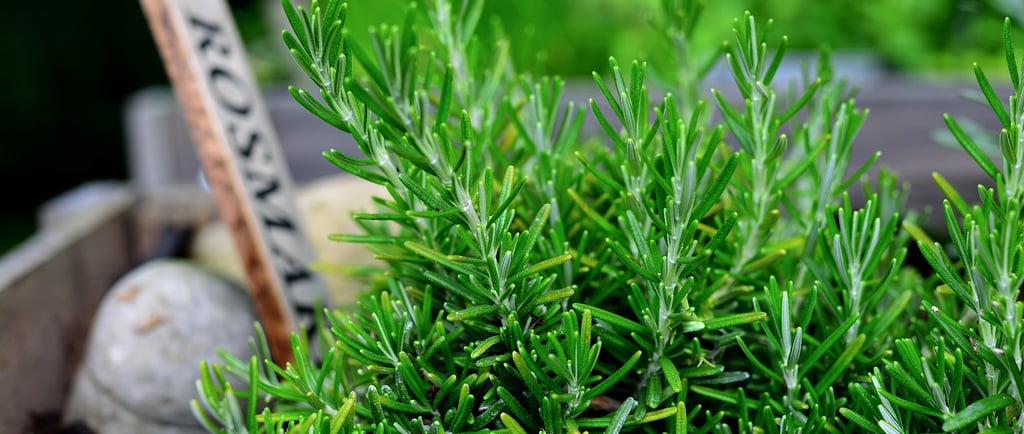Limited time discounts on healthy products!
The Incredible Benefits of Rosemary: A Herb for Cooking and Health
From God's Garden: Rosemary is used in cooking, in herbal remedies and even in cosmetics.
HERBS AT A GLANCE
Janine Reece
10/5/20255 min read


Culinary Uses of Rosemary
Rosemary, a fragrant herb native to the Mediterranean, is renowned for its versatility in cooking. This hardy herb not only increased the flavor of a wide array of dishes but also smells wonderful and refreshing. The strong, woody flavor of rosemary best complements meats, particularly lamb, chicken, and pork. When added to roasts or grilled meats, rosemary creates a savory flavor profile that merges wonderfully with the flavor of the food.
I personally love it in a butter rub for chicken, with Thyme and Garlic . It is so easy to do but makes such an pleasant difference in the taste.
For effective use in cooking, fresh rosemary can be chopped and added directly to marinades or rubs. It can also be infused in oils, allowing the herb’s rich oils to meld with other components, thereby intensifying the dish’s flavor.
For instance, a simple marinade consisting of olive oil, garlic, lemon juice, and chopped rosemary can dramatically enhance the taste of grilled meats and vegetables. Additionally, when used in slow-cooked recipes like stews, rosemary releases its oils slowly, permitting the flavors to reach to the entire dish.
Beyond meats, rosemary serves as an excellent ingredient in herb breads, especially focaccia. The addition of finely chopped rosemary into the dough, along with other herbs and spices really brings out the flavor of the bread, but also makes a nice change from ordinary bread.
I personally love it added to the batter of beer bread, with a little grated cheese, onion and garlic mixed in.
By experimenting with this herb in cooking, both new and experienced cooks can unlock a wealth of flavors, making their dishes more flavorful and enjoyable.
Health Benefits of Rosemary
Rosemary (Rosmarinus officinalis, its formal name), is one of the aromatic or culinary herbs used widely in cooking and baking, but has health benefits too.
Rosemary is know for its high antioxidant content, which helps get rid of free radicals in the body. Various scientific studies have demonstrated that the flavonoids and phenolic compounds found in rosemary can help reduce certain stressors of the body, thereby helping to lower the risk of chronic diseases.
In addition to its antioxidant properties, rosemary has been recognized for its anti-inflammatory effects. Research seems to show rosemary may inhibit certain pathways involved in the bodies inflammation process.
This can be particularly beneficial for individuals suffering from conditions such as arthritis or other inflammatory disorders. By adding rosemary into daily meals, people may experience a decrease in inflammation-related symptoms, like pain.
The herb supplement that I take for my arthritis has rosemary in it.
Another significant health benefit of rosemary is how it adds digestion and cognitive function. The herb is well know for its ability to aid certain digestive issues, such as bloating and gas. The oils in rosemary may help to increase bile production, again adding in digestion.
Furthermore, rosemary is thought to contain compounds that promote improved memory and concentration. This could be good news for those seeking to boost their mental acuity.
To incorporate rosemary into a healthy diet, consider using it to season:
Veggies
meats
legumes
olive oil
tea
With the many ways to use it and all of its health advantages, rosemary is an excellent addition to a balanced and nutritious diet.
Rosemary in Cosmetics
Rosemary is also know for its importance to the cosmetic industry. This herb, boasts a wide range of beneficial properties that enhance both skin and hair care.
One of the primary advantages of rosemary is its antimicrobial properties, which help protect the skin from various infections and impurities. This characteristic makes it useful in skincare treatments aimed at treating acne and other skin conditions.
Additionally, rosemary is known for its ability to stimulate circulation, promoting better blood flow to the scalp encouraging hair growth. This makes it a favored ingredient in many commercial hair care products, particularly those designed to combat hair loss or thinning hair. You can also find shampoos and conditioners enriched with rosemary extract, to invigorate the scalp and fortify hair strands.
I was more fortunate then many woman who have chemotherapy for TNBC, most of my hair grew back. But not all of it. After 4 years, I have an area on my head where my hair never grew all the way back.
I was given prescription for hair restorers, but I found them expensive at $35 - $50 dollars a month. (And it usually takes 3 - 6 to see any regrowth.) In my research for a less expensive way to go, I discovered a study where rosemary oil worked just as well as Minoxidil 2%. After 6 months, the women using rosemary oil had as much hair regrowth as the women using the Minoxidil.
For those interested in using rosemary into their beauty routines, several easy DIY beauty recipes can harness its power. A simple herbal infusion can be created by steeping fresh rosemary leaves in hot water, which can then serve as a refreshing facial toner.
Alternatively, a rosemary-infused oil can be incorporated into massage oils or hair treatments, providing an aromatic experience while delivering the herb's hair grow benefits.
Growing and Harvesting Rosemary
Growing rosemary at home is both easy and very rewarding, as there is relatively little maintenance.
Rosemary prefers a sunny location, ideally receiving at least six to eight hours of direct sunlight each day. Well-drained soil is important as rosemary is susceptible to root rot.
Rosemary does not like its feet wet. I plant mine in a pot, in a mix of potting soil with some orchid bark mixed it. If planting is the ground, you have to amend the soil till you have a sandy or loamy soil with a pH level between 6.0 and 7.0 being ideal for robust growth. (Most of us don't have to worry about ph., but you do need good drainage.)
When selecting which rosemary to plant, consider what you are going to use it for. The most common variety, *Rosmarinus officinalis*, has good flavor and scent, making it popular for use in cooking, and good for home remedies.
Other varieties, such as 'Blue Spires' and 'Tuscan Blue,' are good if you want a pretty, appealing plant. for a shrub garden. They have attractive blue flowers and upright growth patterns. These plants can be grown in pots for container gardening or directly in the ground, depending on your space and personal preference.
Care and maintenance practices are important for keeping rosemary healthy. Regular watering is important, but it is vital to let the soil dry out between waterings. Mulching can help retain moisture while preventing weed growth. Pruning should be conducted in spring to maintain a bushy shape and encourage new growth. But I cut off stems any time to use in cooking.
When it comes to harvesting rosemary, the best time is just before flowering, as this is when the essential oils are most concentrated. Snip off the stems with sharp scissors, taking care not to remove more than one-third of the plant at any one time to ensure continued growth.
For preserving rosemary after harvest, consider drying or freezing the leaves. Air drying in a warm, shaded place allows the herb to retain its essential oils, while freezing in an airtight container helps maintain its freshness for later use. I have put mine in olive oil in an ice cube tray so when I want it, I just pop out a cube.
Rosemary can be used in cooking and baking, as well as an ingredient in cosmetics. Thanks to its antimicrobial properties and circulation-stimulating effects, it is also used in many herbal remedies.


.Disclaimer: All of the content on this website is intended for informational purposes only, and not intended as medical advice. Any action taken based on the content is at your own risk. You should always consult your doctor or medical health professional prior to starting any diet or taking any herb. If you are being treated by a physician and have been prescribed medication, you should seek medical advice before stopping or altering any medication.
Get in touch
Have questions? Comments?
Email me direct ... at reecejanine85@gmail.com
